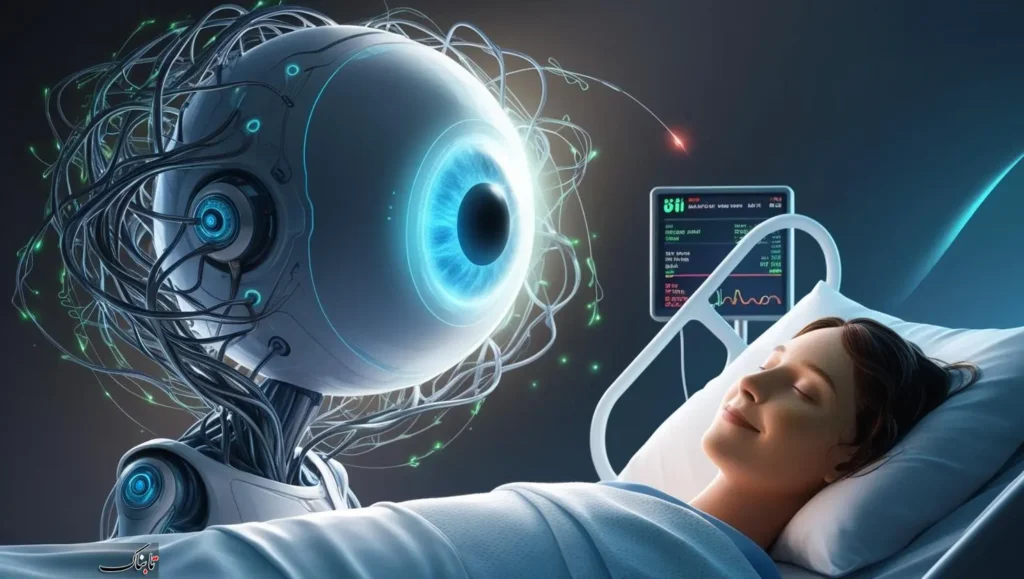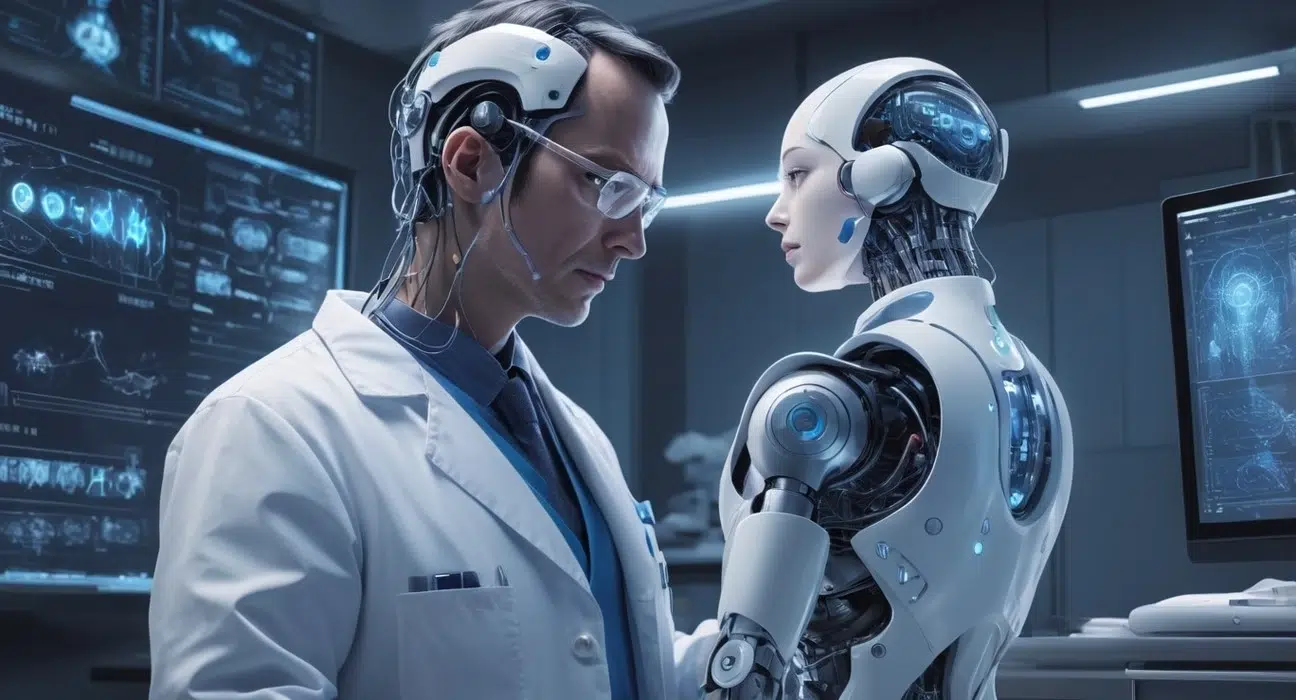The future of medicine according to artificial intelligence
The future of medicine due to artificial intelligence promises profound changes in the diagnosis, treatment and management of human health. By analyzing complex data and providing smart solutions, this technology has provided unique opportunities to increase accuracy and efficiency in the medical field. From diagnosing rare diseases to predicting potential health risks, AI can help doctors make faster and more accurate decisions and patients benefit from personalized treatments. These developments paint a clear picture of a future where access to health services will be easier and more effective for everyone.
One of the key aspects in the future of medicine with regard to artificial intelligence is the ability to analyze massive amounts of clinical and genetic data. This ability enables doctors to diagnose diseases at an early stage and start preventive treatments even before symptoms appear. Also, intelligent surgical robots and machine learning- based tools are changing traditional methods of treatment and have improved precision and safety to an unprecedented level. But along with these positive developments, there are challenges such as ethical issues, data privacy and costs related to the development and implementation of these technologies that should not be neglected.
Due to the speed of technological development, the future of medicine with regard to artificial intelligence also provides an opportunity to reduce health gaps at the global level. In areas where access to specialist doctors is limited, artificial intelligence tools can play an important role in providing telehealth services. However, success in exploiting this technology requires a comprehensive approach that both properly utilizes its opportunities and manages the challenges ahead. In this article, we will take a closer look at the effects of artificial intelligence on medicine and how to deal with the existing obstacles.
Related Article | Will artificial intelligence replace humans?
Artificial intelligence in the diagnosis of diseases
Artificial intelligence has been able to diagnose diseases through the analysis of medical data and images to an unprecedented level.
Diagnosis of complex diseases: Intelligent systems, such as IBM Watson Health, are able to identify diseases such as cancer, diabetes, and heart disease based on clinical data and medical images.
Higher-than-human accuracy: Studies have shown that deep learning models can outperform doctors in some cases, especially in identifying diseases whose early symptoms are very subtle.
Personalized treatments with an AI approach
Traditional medicine often operates on a general approach to treating patients, but artificial intelligence has made it possible for treatments to be personalized based on the individual characteristics of patients.
Application in gene therapy: Smart tools can analyze the genetic map of each person and suggest appropriate treatments.
Predicting the side effects of drugs: AI systems can predict the possible reactions of the patient’s body to various drugs and reduce the risk of side effects.
Robotic surgeries and the role of artificial intelligence
Advanced surgeries using robots are one of the most exciting areas of combining AI with medicine.
Advanced robots like DaVinci: these robots have made it possible to perform complex surgeries with high accuracy and speed.
The futuristic role of AI in surgery: It is predicted that robots equipped with AI will be able to perform autonomous surgeries in the future without the need for human intervention.
Wearable devices and health monitoring
One prominent application of artificial intelligence is its integration with wearable devices designed for health monitoring.
Early detection of health problems: Devices such as the Apple Watch and Fitbit record data such as heart rate, blood oxygen levels and sleep quality. This data can be automatically analyzed by AI and issue early warnings of serious problems.
Management of chronic diseases: Patients with chronic diseases can monitor their health continuously using these devices.
The role of artificial intelligence in the management of epidemics
The experience of the Covid-19 pandemic showed that artificial intelligence can be a vital tool in controlling health crises.
Predicting disease outbreaks: AI models predict the spread of diseases by analyzing epidemiological data and help policymakers in crisis management.
The Future of Global Disease Management: In the future, AI-based global networks will be able to process disease-related data in real-time and issue global alerts.
Reducing medical costs
Artificial intelligence plays an important role in reducing treatment costs by optimizing various processes.
Reducing diagnostic and treatment errors: Smart tools prevent additional costs by providing more accurate diagnoses.
Administrative Automation: AI can optimize administrative tasks such as patient record keeping, appointment management, and insurance processing.
Drug research and development using artificial intelligence
One of the most exciting applications of artificial intelligence in medicine is to aid in the research and development of new drugs.
Accelerating drug discovery: AI algorithms are able to screen billions of chemical compounds in a short amount of time and identify potentially effective compounds.
Example: Insilico Medicine has used AI to discover anti-aging drugs.
Simulating the effect of drugs: Before clinical trials, AI models can simulate the effects of drugs on the body, reducing research costs and time.
Empowering patients through smart tools
Artificial intelligence not only empowers doctors, but also helps patients take a more active role in managing their health.
Medical Virtual Assistants: AI-powered chatbots can provide basic medical information, answer patients’ questions, and even set up appointments with doctors.
Patient education: Smart tools can provide patients with up-to-date and accurate information about diseases and treatments and prepare them to make better decisions.
Smart education for medical students
Artificial intelligence also plays a key role in medical education.
Advanced simulations: AI-based software can simulate real hospital conditions for students and prepare them to face real challenges.
Analyzing student performance: Intelligent systems can analyze student progress and identify their strengths and weaknesses.
Preventive medicine with the help of artificial intelligence
In the future, medicine will move from treatment to prevention, and artificial intelligence will play a vital role in this field.
Disease prediction: AI models can predict the probability of various diseases based on medical history, lifestyle and genetic data.
Promoting public health: AI data-driven health campaigns can encourage people to adopt healthier lifestyles.
In general, artificial intelligence will lead medicine in a direction where not only diseases are diagnosed faster, but also treatments are more accurate and personalized. While there are challenges such as ethical issues and the need for advanced infrastructure, the collaboration of humans and artificial intelligence promises a bright future for human health.
Opportunities related to the future of medicine due to artificial intelligence

Early diagnosis and prevention of diseases
AI can help diagnose diseases at an early stage, where treatment is easier and more effective.
Medical data analysis: AI algorithms are able to identify subtle patterns in medical data such as blood tests or scans.
Disease prediction: AI-based predictive models can predict diseases such as diabetes, heart disease or even cancer before symptoms appear.
Personalized treatments
One of the biggest opportunities for artificial intelligence is the development of treatments that are tailored to the specific needs of each patient.
Gene therapy: AI can analyze the genetic map of patients and provide precise treatments for diseases related to genetics.
Predicting response to drugs: AI systems can predict which drugs each patient will respond best to.
Reducing costs and increasing access to medical services
Artificial intelligence can reduce treatment costs and make health services more accessible by optimizing processes.
Automated systems: Automated tools such as smart chatbots can help reduce physician workload and consultation costs.
Telemedicine: In remote areas or developing countries, AI can make medical services available through online tools.
Faster drug development
Artificial intelligence has made the process of discovering new drugs faster and more efficient.
Molecular simulation: AI can simulate new chemical compounds and predict their effects.
Real experience: Using artificial intelligence, DeepMind has predicted protein structures and provided a better understanding of diseases.
Improving complex surgeries
Surgical robots: The use of artificial intelligence in robotics has increased surgical precision and reduced human errors.
Surgical planning: AI-based systems can perform detailed planning before surgery to minimize risks.
Continuous health monitoring and lifestyle changes
Smart wearable devices: Smart watches and gadgets are able to continuously monitor data related to heart rate, blood pressure and physical activity.
Providing health recommendations: AI tools can analyze this data and give people suggestions for improving their lifestyle.
Challenges related to the future of medicine due to artificial intelligence
Ethical and privacy concerns
One of the biggest challenges in using AI is patient data security and ethical issues related to the use of personal information.
Privacy: Artificial intelligence systems require large amounts of medical data, including sensitive patient information.
Misuse of data: If this data is not managed properly, it can be misused.
Excessive dependence on technology
Reduced role of human doctors: Some worry that the widespread use of AI may reduce the need for human doctors and their skills.
System errors: Although AI is usually accurate, when errors occur, these errors can have serious consequences for patients.
Restrictions on access to high-quality data
Lack of data standardization: One of the main challenges in training AI systems is the lack of high-quality and standardized data.
Geographic limitation: In many countries, medical data is collected in a scattered and incomplete manner, which is an obstacle to the development of intelligent algorithms.
High implementation costs
Expensive infrastructure: The development and implementation of AI-based technologies require large investments, which may be difficult for low-income countries.
Training and acceptance of doctors: training doctors to work with AI systems requires time and money.
Complex ethical decisions
Level of trust in AI: In some cases, AI systems may make decisions that conflict with human perspectives.
Liability: In case of errors, it is not clear whether the responsibility lies with the doctor or the technology manufacturers.
Solutions to solve the challenges
Compilation of clear rules and standards
To address ethical and privacy concerns, there is a need for comprehensive laws and clear standards in the use of artificial intelligence.
Privacy laws: Like GDPR in Europe, patients can be protected from data misuse.
Shared responsibility: Defining responsibility between clinicians and technology developers is essential.
Infrastructure development in developing countries
Low-income countries can reap the benefits of AI by investing in cost-effective technologies and international cooperation.
The combination of artificial intelligence and humans
To increase effectiveness, AI is best served as a complementary tool to human doctors, not a replacement for them.
Improving data quality
Investing in standardized data collection and creating shared data banks can help better AI development.
Last word
Finally, the future of medicine due to artificial intelligence is on the threshold of a huge revolution that can help improve the quality of human life and improve the level of public health. Despite the countless opportunities that this technology offers in various fields of medicine, from more accurate diagnosis and personalized treatments to increasing access to health services, there are also many challenges that need to be seriously addressed. Ethical issues, data privacy and high implementation costs are among the important obstacles that should be considered in the path of using artificial intelligence in medicine. In this regard, cooperation between scientific communities, technology and policy makers is necessary to take advantage of the potential of this technology and avoid its risks by adopting a balanced and intelligent approach.
Must Read:
Making Cancer Screening More Innovative
The Importance of Mental Health Awareness
Blog Forbes Daily: Join the Blog Forbes and get our best stories, exclusive reports and important analysis of the business daily, News, Travel, Health, Lifestyle and more.

